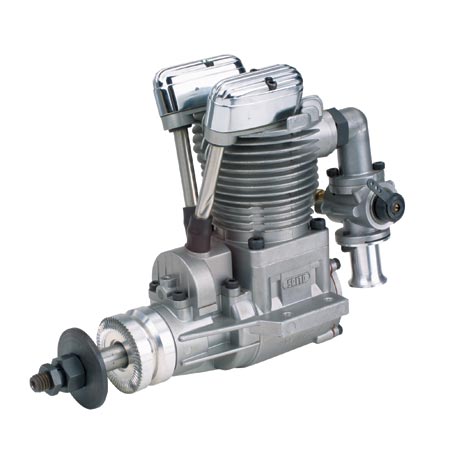Four stroke engines
Four cylinder engines are the most fuel efficient internal combustion engines. They however have lower vibration and noise levels than the two stroke engines, but have a higher vibration level than a Wankel engine. They also have a lower power-to-weight ratio than a two stroke engine of comparable power output.
Enya engine

ENYA R.155.4C engine from modelflight.com
| engine | capacity in cc | power output in kWatts | J/ccfam |
|---|---|---|---|
| 120FS | 19.93 | 1.566 at 11,250 rpm | 0.838 |
| R.155.4C | 25.42 | 1.86 at 11,250 rpm | 0.780 |
Notes
- All Enya engines use " glow fuel" : methanol + 5 to 15 % nitromethane + 16% minimum synthetic castor oil lubricant.
- J/ccfam = energy in Joules per cc of fuel-air mixture
- For RCVxx-CD, J/ccfam = ( power_in_watts x 60 x 2 ) / (capacity_in_cc x rpm ) = measure of energy efficiency
O.S. Engines

O.S. Engines FS-70 Ultimate high performance, four stroke, engine with a fuel pump. Photograph from www.osengines.com

O.S. Engines FT-300 two cylinder engine from www.osengines.com
| engine | cylinders | capacity in cc | weight in kg | power output in kWatts | kW / kg | J/ccfam |
|---|---|---|---|---|---|---|
| FS-70 Ultimate | 1 | 11.45 | 0.502 | 0.894 at 11,000 rpm | 1.781 | 0.852 |
| FS-91 S II | 1 | 15 | 0.649 | 1.193 at 11,000 rpm | 1.838 | 0.868 |
| FS-120S III | 1 | 20 | 0.921 | 1.56 at 12,000 rpm | 1.694 | 0.76 |
| FT-160 | 2 | 26.5 | 1.1 | 1.49 at 10,000 rpm | 1.354 | 0.675 |
| FS-200U | 1 | 32.4 | 0.83 | 2.16 at 9,000 rpm | 2.605 | 0.890 |
| FT-300 | 2 | 49 | 1.828 | 3.0 at 7,000 rpm | 1.641 | 1.050 |
| FF-300 radial | 5 | 49.7 | 2.673 | 3.0 at 8,000 rpm | 1.122 | 0.905 |
| FF-320 | 4 | 53.2 | 2.19 | 3.06 at 8,000 rpm | 1.37 | 0.846 |
Notes
- All O.S. engines use " glow fuel" : methanol + 5 to 15 % nitromethane + 16% minimum synthetic castor oil lubricant.
- J/ccfam = energy in Joules per cc of fuel-air mixture
- For RCVxx-CD, J/ccfam = ( power_in_watts x 60 x 2 ) / (capacity_in_cc x rpm ) = measure of energy efficiency
 The O.S. Engines FF-300 radial engine from
towerhobbies.com/products/os_engines/osmg1160m.html
The O.S. Engines FF-300 radial engine from
towerhobbies.com/products/os_engines/osmg1160m.html

The O.S. Engines FF-320 "flat four" from osengines.com/engines/osmg1320.html
SAITO single cylinder engines

The SAITO 180 engine. Photograph from horizonhobby.com
| Saito Engine | capacity in cc | weight in kg | power output in kWatts | Power-to-Weight in kWatts/kg | min rpm | max rpm | fuel efficiency in J/ccfam |
|---|---|---|---|---|---|---|---|
| FA-45S | 7.50 | 0.440 | 0.522 | 1.186 | 2,000 | 12,000 | 0.696 |
| FA-50 | 8.20 | 0.435 | 0.634 | 1.457 | 2,000 | 12,000 | 0.773 |
| FA-56 | 9.20 | 0.410 | 0.671 | 1.637 | 2,000 | 12,000 | 0.729 |
| FA-56F | 9.20 | 0.410 | 0.671 | 1.637 | 2,000 | 12,000 | 0.729 |
| FA-62a | 10.24 | 0.469 | 0.746 | 1.590 | 2,000 | 12,000 | 0.728 |
| FA-65 | 10.60 | 0.550 | 0.708 | 1.288 | 2,000 | 12,000 | 0.668 |
| FA-72 | 11.80 | 0.470 | 0.895 | 1.904 | 2,000 | 12,000 | 0.758 |
| FA-80 | 13.10 | 0.540 | 0.969 | 1.795 | 2,000 | 12,000 | 0.740 |
| FA-82a | 13.80 | 0.453 | 1.119 | 2.469 | 2,000 | 12,000 | 0.811 |
| FA-91S | 15.00 | 0.555 | 1.193 | 2.150 | 2,000 | 11,000 | 0.868 |
| FA-100 | 17.10 | 0.551 | 1.342 | 2.436 | 2,000 | 11,000 | 0.856 |
| FA-120S | 20.00 | 0.900 | 1.641 | 1.823 | 1,900 | 10,500 | 0.937 |
| FA-125a | 20.52 | 0.700 | 1.641 | 2.344 | 1,800 | 10,500 | 0.914 |
Notes
- All Saito engines use " glow fuel" : methanol + 5 to 15 % nitromethane + 16% minimum synthetic castor oil lubricant.
- J/ccfam = energy in Joules per cc of fuel-air mixture
- For RCVxx-CD, J/ccfam = ( power_in_watts x 60 x 2 ) / (capacity_in_cc x rpm ) = measure of energy efficiency
SAITO multi-cylinder engines
Images from horizonhobby.com

The "vibration-free" SAITO FA-182TD.

The Saito FA-300T twin engine.

The SAITO FA-170R three cylinder radial engine.

The Saito FA-325R5 radial engine.
Engine trends for four stroke engines

Pout scales with engine capacity as Pout = 0.073 * x + 0.031 for Pout in kWatts, where x is the engine capacity in cc.

The average power-to-weight ratio for the above engines is 1.727 kWatts / kg. The superiority of the Saito engines in respect of power-to-weight ratios is clear.

The average engine efficiency for the above engines is 0.813 J / ccfam. For the Saito engines, we notice the engine efficiency saturates for engines with a capacity of 17 cc and above.